Why INFJs and INTJs Get Overstimulated
One thing I struggle with regularly, especially as an INTJ mother, is the tendency to get overstimulated. We INFJs and INTJs live so completely in our heads that outside stimuli, if not pleasant, can be incredibly stressful. Unlike sensors, who are more focused on the world around them, INXJs are often focused internally. Their minds’ are buzzing with ideas, concepts, strategies, and symbols.
For example, while I’m in the shower I tend to think of a lot of ideas and concepts. I’ll often forget if I just shampooed my hair, conditioned it, or if I did, how many times I’ve done it. Sometimes I end up washing my hair three times because I’ve gotten so caught up in ideas that I’ve completely lost touch with what I was doing. I know this sounds flighty, especially to sensors, but it’s one of the problems with being a dominant Ni (introverted intuition) user. I’m not saying every Ni-dominant type is as much of an airhead in the shower as I am…but this type of thing tends to be a problem for a lot of us.

Blogger Stephanie Briggs describes this perfectly; “INFJs tend to be loosely tethered to physical reality, suffering from clumsiness (“How did I get this bruise?”), spaciness, and a distaste for practical details and tasks.”
INFJs and INTJs combine dominant introverted intuition (Ni) with inferior extraverted sensing (Se). Our Se is very underdeveloped and sensitive, meaning that we consider outside stimuli to be a major distraction from what’s really “important” (what’s going on in our heads).
Let’s put it this way, Just like ISTPs and INTPs find extreme emotions distracting and kind of disturbing, INFJs and INTJs find external stimuli distracting and disturbing. If we’re in a tranquil atmosphere, a clean house, or if there’s soft music playing, that’s fine. In fact, we really like that. Tranquil surroundings and beautiful places are really important to people with inferior Se. Our sensitivity to outside stimuli means that while we’re extremely sensitive in a negative way to unpleasant or loud outside stimuli, we are incredibly affected in a positive way by pleasant outside stimuli.
Not sure what your personality type is? Take our new personality questionnaire here. Or you can take the official MBTI® here.
P.S. If you want even more in-depth information on INFJs and relationships, careers, parenthood, and more check out my eBook: The INFJ – Understanding the Mystic.
This article contains affiliate links to books on Amazon. If you purchase one of these books, I get a small kickback that I can use to pay for hosting and other demands of this site. I only recommend books I love.
INFJs, INTJs, and the Science of Their Minds
UCLA professor Dario Nardi conducted a study on personality type and brain activity using EEG technology. He has this to say about INTJs and INFJs:
“Ni types often show a whole-brain, zen-like pattern. This pattern occurs when all regions of the neocortex are in synch and dominated by brain waves that are medium-low frequency and very high-amplitude. This pattern is typical of someone whose mind is awake yet relaxed….What is this zen state like? When presented with a problem, the Ni types seek to harness all neocortex regions in order to “realize” an answer…This zen state works best when focusing on a single question, without distractions that might cause the various regions to fall out of synch. The person might think, “Be quiet world, I just need to stop and think!” When an answer does pop to mind, it might seem like an expert’s work with flourishes of novelty or even an unusual approach to a task.”
Nardi also says in his book The Neuroscience of Personality, that INTJs and INFJs prefer time away from external stimulation and mundane demands in order to access their rich internal processes. To find out more about the science of the Myers-Briggs types check out my article Your Myers-Briggs® Personality Type and Your Brain.
Why Parenting Can Be Especially Challenging for INFJs and INTJs
Quiet time alone. It’s what INTJs and INFJs need. I’m a mother of five kids. I completely adore them. My love for them is incredibly strong. I also homeschool them, so they’re pretty much with me all the time. With kids there will always be interruptions, especially with my toddler who is in a babbling/screaming/squealing phase. I get migraines four days out of the week. I get lost in thought and then there’s the “Mom! Mom! Mom!” chant that all mothers are familiar with. And from all my experiences as an MBTI® practitioner, I’ve realized that INFJs and INTJs struggle with this aspect of parenting a little more intensely than other types.
Why We Hate Interruptions So Much
As a dominant Ni-user, I think in puzzle pieces and clues. In my average mental state, I am connecting dots constantly. That’s just how my brain works. When interrupted, all those little puzzle pieces, all those connected dots, scatter everywhere. I’ve lost it. For non-parents, the distraction could be someone at work interrupting them with questions or the ping of a text message on your phone. I’ve found that I almost always have my phone silenced for this reason.
A lot of INFJs and INTJs are highly-sensitive people. We don’t like fluorescent lights, loud noises, bright, stimulating environments. My husband likes to laugh at me sometimes because I always want to dim the lights upon entering a room. After I do this I am visibly more relaxed and at ease. He also enjoys action movies, and I do too sometimes, but after a while, the explosions and bright saturation of colors get to be too much for me. I want to bury my head in a pillow and block it all out. I’m not prone to outbursts of anger, but if my kids are being especially loud (as kids are prone to do), I often have to go to my room and take a “time out.” I close the door, lay face-down on my bed for a few moments so that all sensory stimulation is cut off, then I get back up, take a deep breath, and try to keep going with the day. Taking these little breaks is part of what keeps me sane.
The Importance of Alone Time
Introverted intuition is such an intensive, introspective process. In order for an INFJ or an INTJ to truly be “in the zone” and able to function properly they need to be able to block out all other stimulation and get into a relaxed mental state. Then they can form connections and develop insights. It can take a while to truly get into this “zen state” as Dario Nardi describes it. Often, for me, it happens right around the time I’m trying to go to sleep. You can imagine why! Everything’s dark and quiet and I’m able to completely isolate myself with my thoughts. All a sudden my mind is bursting with insights and revelations that never occurred to me throughout the day.
If I get into that relaxed state at home during the day, and then someone turns on some loud music, a TV show, or there are random interruptions or questions, it can be extremely overstimulating. In fact, if my inferior Se is “triggered,” I can fall into the grip of Extraverted Sensing (Se), and become overly indulgent (as Se-inferior types tend to do). This means that in order to “ground” myself in reality, I sometimes will succumb to over-eating, listening to incredibly loud music, or engaging in an unhealthy way in any kind of sensory activity.
All things considered, if you have an INFJ or an INTJ in your family you can definitely try to make their life a little easier by giving them some alone time or not interrupting them when they’re deep in thought. If you are a Ni-dominant type then you can try to take little segments out of the day to shut out stimulation and think, even if it’s just for a little while. One of the ways I do this with kids is by packing up my toddler in the stroller and taking him for a walk every single morning. He gets really quiet, and it’s very peaceful, and I can just think. Everyone has different methods and different ways they can achieve this solitude and time to focus.
What are your thoughts?
What do you do to block out sensory stimulation? What kinds of ways do you get into a positive mental state? I’d love to talk to you in the comments!
Find out more about your personality type in our eBooks, Discovering You: Unlocking the Power of Personality Type, The INFJ – Understanding the Mystic, The INFP – Understanding the Dreamer, and The INTJ – Understanding the Strategist. You can also connect with me via Facebook, Instagram, or Twitter!
Other Articles You Might Enjoy:
Here’s Why INFJs and INTJs Seem “Intense”
10 Intuition Hacks for INFJs and INTJs
The Unique Intelligence of INFJs, INTJs, ENFJs, and ENTJs
All About INTJs
Get Your Free INFJ eBook
As a thank you for subscribing to my newsletter I will send you this free eBook PACKED with self-care tips, creativity hacks, and more! You'll also get a 3-day email course for understanding your personality type better!



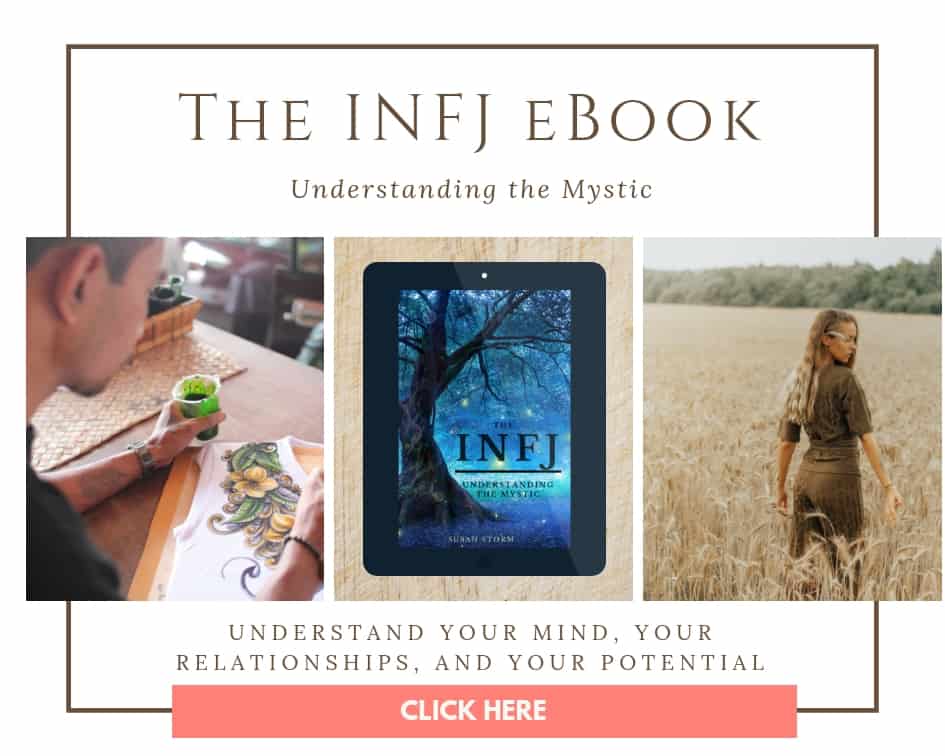







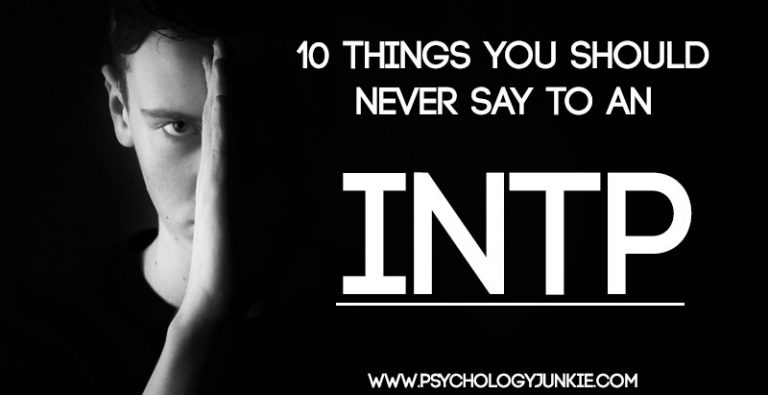
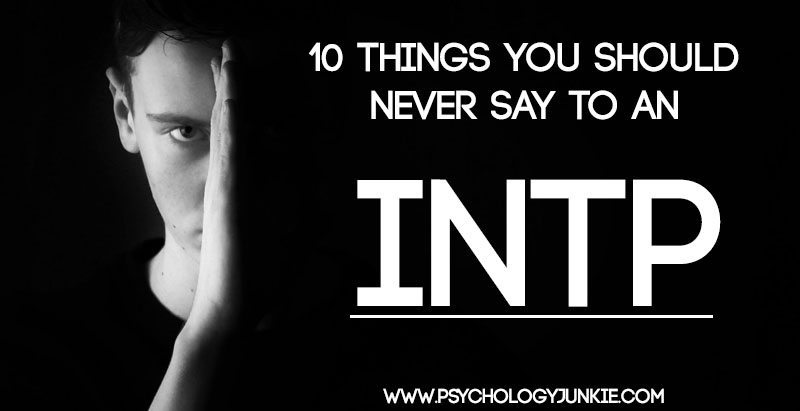

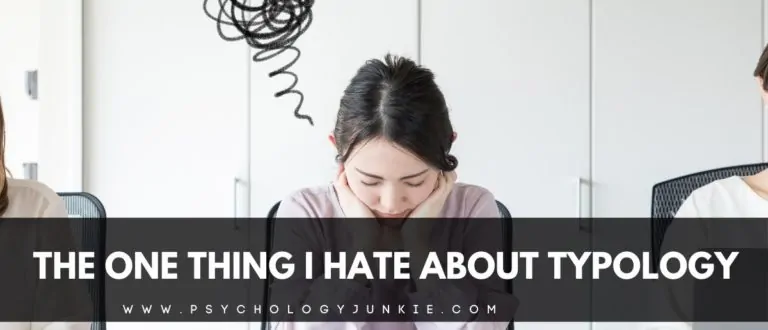
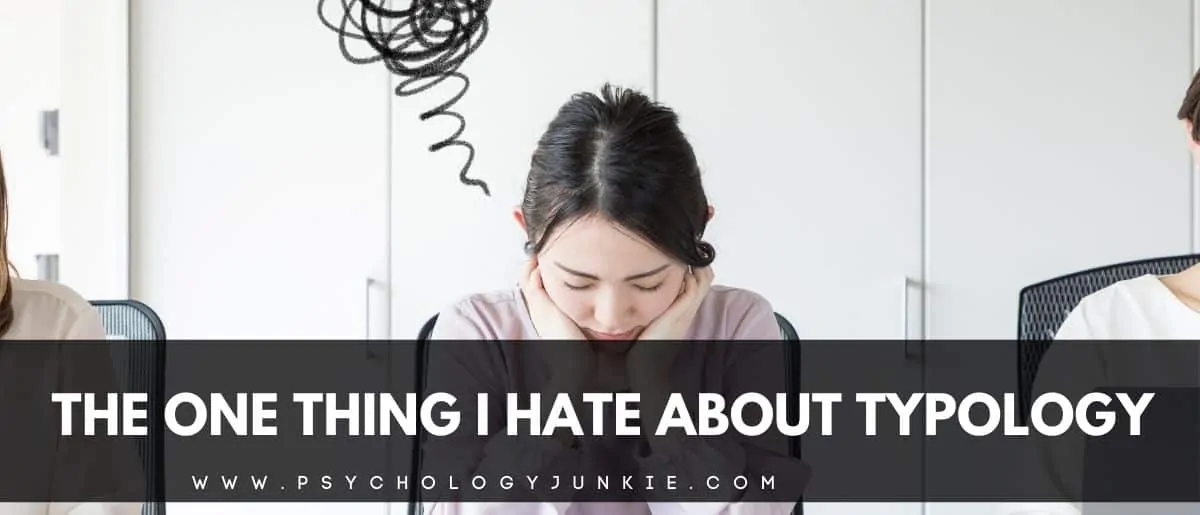
As an INFJ personality type I can relate so much to over stimulation. I never realized this was a problem for me until I met my husband and his family. He has a large family. After a few large family gatherings, he pulled me aside one day and basically told me I had an attitude and wanted to know what was going on. It was then it occurred me I was having problems dealing with all the noise and chaos and just wanted to go home. Over time I have learned how to deal with the over stimulation better and have learned my limits and when to go home before becoming completely withdrawn. I worked with a child who had Autism. I felt like I understood the child better because I know what it feels like to be over stimulated. Now, when I get home from larger gatherings and groups of people I know I can go to my room, usually with it darker and quiet and breathe. I also find myself deep in thought and have to bring myself back to reality. I need time to process everything I witness and feel.
I have an extremely chatty older son. Being an introvert, this is very tough for me to deal with when he’s not at school. Putting on some soothing or up tempo music (songs we can sing to) while we play both helps me have a touchpoint to focus on and keeps him occupied a bit. Otherwise, taking the kids to the park or similar so I can get a mental break helps too. Also reading to the kids is one of my happiest times. But otherwise it is a huge struggle, & makes me feel like I’m failing a lot. It’s nice to hear others have similar issues!
Thank you for the insights. I am an intj and it is always fortifying to see people expressing similar experiences and feelings. My time as a mom with a young child was just as you described. Walks with the stroller were a lifesaver, with my grandkids too!
I’ve been in the grip of extraverted sensing for years. I have two children who will turn 5 and 3 at the end of the summer. The last five years have been the most challenging of my life.
This last year saw my parents moving in with us. Six people in a three bedroom house! I’ve never been so desperate for quiet alone time, and I’ve never had so little opportunity for it. I am never, ever alone (my two year old). The volume on everything is cranked up to maximum, including on the kids themselves lol. There is clutter and mess *everywhere*. I get overstimulated in the first five minutes of the day just walking downstairs; the debris and crumbs on the floor, the laundry filling the hallway, the piles of things on the stairs because I’m the only one who takes things upstairs but I forget half the time. And the noise and tactile sensations start *before* I wake up. My son wakes me up by crawling in with me and cuddling, which is awesome, and which I participate in fully… But it’s a lot and by the time noon arrives I am so done.
My extraverted sensing took over a long time ago. I eat pounds – literally pounds – of chocolate in an evening, and I frequently play video games all night. Why don’t I sit in a darkened room and think during that time? Because the others don’t go to bed until well after midnight, and I’m up at 5:00 AM with the kids.
I hope desperately that I will find a solution to this. I love my family so, so deeply and passionately, but the guilt eats me alive, because I am almost constantly trying to get away from them. It kills me. I’ll regret the way I delayed coming home so often when they’re older, but I can’t survive otherwise.
Worse, two of the other three adults in my household are extraverts and quite enjoy the chaos and constant stimulation. Which would work out, wouldn’t you think? Let them handle some of the crazy loud and bouncy stimulation? Sure, they do, but they make their disapproval known. I’m an airhead, daydream too much, lazy because I always want to lie down alone. Anti-social. I never want to talk in the evenings, obsessed with video games. No, I’m obsessed with being in another world where I have some control and my #_&@? progress is SAVED for the next time! Not like real life, when every morning I start over from scratch, putting things away that were already put away twice yesterday, etc.
For so long, I believed what my family thought about about me. I watched my mommy friends barely break their stride in conversations when interrupted and who can do three chores at once and never seem to get tired of the company of their own kids. I felt like such a failure. I still struggle with it. I used to be really proud of being an INFJ. Now I feel like it’s almost a disability on top of being deaf and dealing with a mood disorder. I find myself expressing my shadow traits (for me, that’s unhealthy ESTP traits) more and more in an effort to cope.
But at least now I know that nearly all INFJs struggle with these aspects of parenting and living with other people. I’m not yet proud again to be an INFJ, but articles and comments like these have gone a long way to alleviating some of the shame and guilt. Thanks for writing it! Sorry my comment got so long. 😛
Let me recommend earplugs and an eye mask. You can delegate one of the other adults to be on night watch. They can wake you if needed. It was the most healthy thing I ever did for myself. Good sleep is a great antidote for the need to burrow (into another reality or a pound of chocolate).
Earplugs are a godsend !
Sorry, I meant to say that I’m never alone (my two year old sleeps in the same room with me.
It’s really good to hear that being introverted on any level is normal. I can also understand from experience the cutting in the teen/young adult age. It was a sort of release when your surroundings became to be too much. I’m a single mother of two kids, ages 8 & 11. My 8yo. is a seeker and extremely extroverted. She’s loud, talkative, and when frustrated she screams. Ack! My 11yo is introverted like me, but needs constant physical affections. Hugs every few minutes etc. So I was shocked to read that its normal to want to run away for awhile. To need time outs. For sanity sake. So thank you for sharing with us so we don’t feel so alone and guilty!
I’m a INTJ turned INFJ. Really thankful to have come across this because sometimes I get symptoms of anxiety just because of thoughts like “the world is using too much electricity” and I’d itch to turn off every light in the house and hide somewhere dark to feel better. But also, I have this intense anxiety of rape even though I didn’t go through anything too traumatic. Not sure if this is due to overstimulation from the external environment (boys often reveling in talking about sexual issues and exerting that alpha male attitude, or media exploiting rape or sex as part of the storyline.), or is it just me :(.
For me getting out into the world to walk around made me feel lots better and less caged. Being in a big room/ lounge without people is the best. But when someone comes in to study/ use the room, I get uncomfortable.
INTJ here. I find this to be very true and although 2 out of my 3 children have grown and gone now, this post, along with the comments, took me back. My problem was always getting lost in ‘cleaning the house’, when in reality, I was lost in thought.
When the children were young, I would have immense guilt when one of my children would cry out in frustration, “Mom, STOP cleaning and pay attention to me!” It was also an easy way to avoid dealing with their intense emotions (2 out of 3 being INFPs). I wasn’t sure how to handle them.
I will say to any mothers struggling with guilt associated with this, your children will be okay! I’ve had in depth conversations with them and apologized excessively for not truly being there when I should have. Today, they have a better understanding. Thanks for the read!
I’ve been asking myself, an INFJ, why am I so shy and avoidant of people my whole life. (I’m 59.) I’m like a teenager, who looks away when being talked to. Why am I so afraid to go visit people? I have a hard time opening up, speaking up, focusing, being calm, handling my energy, and I do have a lot of nervous energy. I think it’s probably a problem of needing grounding. I’m a whirling dervish. I sail in, spout what I’m there for, and wheel out again as fast as I entered, without ever taking a moment to ask, ‘how are you?” My energy is out of wack. So I’ve been looking into it, and I have come to the conclusion that making connections with people requires being in the body to a certain extent. So I got the idea to follow the rational thought of the people I am engaging with, a physical thing, and my ability to make connections with people is much improved. I am politer, less rushed, less flippant, more careful, more caring, more social, less afraid, more confidant in myself, more patient. It’s made a huge difference for me. Just wanted to share, because I think it’s a Ni/Se thing. I agree that we need to develop Se.
Does this corelate to mental issues like OCD?